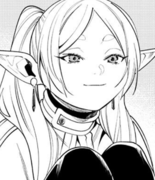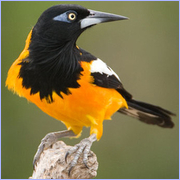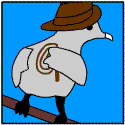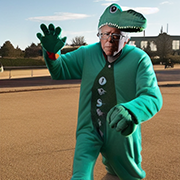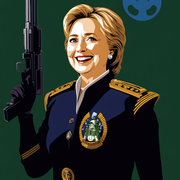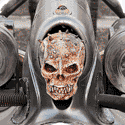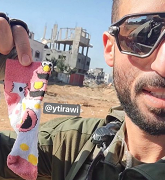|
Borneo Jimmy posted:Yes lets just ignore the fact that these jailed opposition leaders have been involved in multiple violent attempts to overthrow the government. The late and lamented Eternal Commander Of The Revolution was involved in two violent attempts to overthrow the democratically-elected government back in 1992, but no-one seems to hold it against his sacred memory.
|
|
|
|

|
| # ? May 4, 2024 13:46 |
|
Don't engage the idiot in the room.El Hefe posted:A couple months ago a member of the Policia Nacional Bolivariana murdered a 14 year old boy in broad daylight in the middle of the street during a protest and Maduro still blamed it on the opposition. MOTHERFUCKER. You know, I never bothered to check this piece of news, but my local Kircherista party in the University I attend said it had been a newspaper's mistake, and it actually happened on Brazil. No surprise, had an argument the other day where these assholes argued that the Venezuelan Armed Forces have NEVER acted against the Pueblo Unido's interest. 
|
|
|
|
Azran posted:MOTHERFUCKER. You know, I never bothered to check this piece of news, but my local Kircherista party in the University I attend said it had been a newspaper's mistake, and it actually happened on Brazil. No surprise, had an argument the other day where these assholes argued that the Venezuelan Armed Forces have NEVER acted against the Pueblo Unido's interest. His name was Kluivert Roa. He was murdered on February 24 in San Cristobal. Last I heard, the officer in question had been arrested, but I haven't heard anything about the case since. Here is a video of the immediate aftermath of Kluivert's death. Be warned: the video briefly shows Kluivert's dead body lying on the ground. At around 3 seconds, you can see a man kick a fleeing National Police officer (presumably the one the crowd believes shot Kluivert) in the back. Later in the video, once the officers have regrouped, they use tear gas to try to disperse the crowd.
|
|
|
|
One thing I've been wondering; how is Jose Mujica viewed in Latin America and Venezuela? He's rarely ever mentioned in the US, but when he is it seems generally positive, and everything I've heard sounds like he's one of the rare decent, honest politicians. News tends to make its way over here skewed, though, so I'm curious if he's well regarded over there, and, on a more general note, do you think Venezuela and the other failed left wing governments have hurt socialism in Latin America?
|
|
|
|
He seems like the old, cool grandpa who is cool with pot. He has always sounded like a particularly decent guy that goes all in with the humble old man stereotype. I have a kneejerk reaction to socialism and leftist movements so yeah. They have hurt it. Azran fucked around with this message at 18:42 on Apr 24, 2015 |
|
|
|
Jose Mujica is a saint.
|
|
|
|
Rent-A-Cop posted:Will the PSUV actually hand over power if they lose a close election? Adventure Pigeon posted:What would be the consequences if they didn't? On top of what Labradoodle said, a really interesting factor in this equation are the colectivos armados, which Amnesty International and other human rights organizations have called "pro-government armed groups." Venezuela has experienced a period of radicalization during the PSUV era, a period which has arguably intensified over the past two years. As I've mentioned before, one of the pillars of Maduro's tenure as president has been the union civico-militar, which is the blurring of the boundaries separating the military and civilian spheres. This line of thinking is largely responsible for the rise of militia groups in the country, as well as that of irregular groups such as the colectivos armados. For example, just this past week, Maduro was touring a factory in the western part of the country when he asked the workers, "Are you willing to pick up a rifle to defend the homeland with your lives?" This is just a small example of a trend which has seen civilian groups receive more and more responsibility when it comes to defending the revolution. Exactly what role (if any) pro-government armed groups will play in a situation where the PSUV loses an election is a worthwhile questions to ask. To begin to answer this question, it helps to look at a couple of instances from the last time these groups were active in large numbers: the protests of last year. For example: 1. Maracaibo, Zulia state, March 27 2014: A pro-government armed group attacked the Palaima residential complex. Here's footage briefly showing security forces (probably National Guard) mingling with the pro-government attackers: https://www.youtube.com/watch?v=-gmsTXibBqg 2. Merida, Merida state, February 12 2014: A pro-government armed group attacked a residential complex, breaking into cars and generally wreaking havoc: https://www.youtube.com/watch?v=WzBlPlbheck 3. (Probably Caracas), February 2014: A pro-government armed group damages property and breaks into an apartment complex. The woman crying in the video is leaving a voice mail on someone's phone, and calls the group "los tupamaros", which is sometimes used interchangeably with colectivo armado: https://www.youtube.com/watch?v=I6fCBRB4G9k Amensty International has pointed out that pro-government armed groups have been observed acting side-by-side with security forces; other times, the groups have been observed acting alone, but within sight of permissive security forces. It's clear that these groups have been allowed to operate with the consent of the government to terrorize/punish the citizenry. If history is any indication, it's likely that any existential threat against the PSUV will likely mean the return of the colectivos. kapparomeo posted:The late and lamented Eternal Commander Of The Revolution was involved in two violent attempts to overthrow the democratically-elected government back in 1992, but no-one seems to hold it against his sacred memory. Camarada, you've been gravely misinformed. Those weren't coups: they were "acts of dignity".
|
|
|
|
 
|
|
|
|
Comrade Glorious Eternal Leader Chavez lookin' good there.
|
|
|
|
Chuck Boone posted:Camarada, you've been gravely misinformed. Those weren't coups: they were "acts of dignity". I'm curious about this actually. I'm aware that PSUV members will automatically start beating anyone from the opposition (regardless of origin) over the head with the 2002 putsch whenever Chavez was or Maduro is questioned about their democratic credentials - how often did people try to come back at Chavez with his own failed putsches, and how well did that go down with the Leader?
|
|
|
|
kapparomeo posted:I'm curious about this actually. I'm aware that PSUV members will automatically start beating anyone from the opposition (regardless of origin) over the head with the 2002 putsch whenever Chavez was or Maduro is questioned about their democratic credentials - how often did people try to come back at Chavez with his own failed putsches, and how well did that go down with the Leader? To the PSUV, the coups of 1992 (remember that there were two attempts: in February and in November) were really the start of the Bolivarian revolution. The PSUV views Chavez's election in 1998 as a feat of vindication: a sign that the people truly wanted Chavez and Bolivarianism, and that the only thing that stopped the 1992 coups was not popular resistance, but rather the brute force of the corrupt state they were trying to replace. While I admittedly am not very well read on the early stages of Chavez's presidency, I can tell you that the whitewashing of the coups happened immediately after Chavez took office. Chavez was elected on December 6, 1998; he was inaugurated on February 2, 1999. Two days later, he headed the first military parade commemorating February 4 in the Paseo los Proceres in Caracas (Here's a three hour videos showing the event: https://www.youtube.com/watch?v=CRdABLGo8E0). At around 1:11, Chavez begins to speak, and while I unsuccessfully tried for 10 minutes to translate part of his speech for you (Chavez had a tendency to ramble), I can tell you that he spoke of his ascension to the presidency as more or less a culmination of the movement that began with the 1992 coups. Right from the get-go, the coups of 1992 were not coups; or, at least, they were the good kind of coup. As soon as Chavez was elected, anyone who criticized him for having led a coup was factually wrong; he was the leader of a popular revolution that had simply jumped the gun. How often critics brought this up is difficult to say, but the effect was that the state narrative was so all-encompassing that any criticism would have been viewed as being objectively wrong.
|
|
|
|
Imagine if he had succeeded with the 1992 coup
|
|
|
|
El Hefe posted:Imagine if he had succeeded with the 1992 coup Venezuela would be even worse than it is now? I can't see PSUV handing over power peacefully. I can, however, see a civil war occuring as PSUV attempts to retain power despite popular opinion being against them due to the continual decline of economic opportunity in Venezuela. If Maduro isn't responsible for anything, maybe a responsible leader should take charge in Venezuela.
|
|
|
|
El Hefe posted:Imagine if he had succeeded with the 1992 coup Probably would have been for the best, compared to what happened. Oil prices were flat through the 90s, so there would have been no artificial insulation from the disastrous economic policies of Chavismo followed by the catastrophic crash we're having now. Also, the 1990s were a low ebb for left-wing movements since the actual realities of Communism and its failure were an event of recent memory, so Chavez would not have benefited from the regrouped idiot propaganda brigade abroad. There would have been successful international pressure to return to democracy by the late 1990s, followed by the election of some reasonable candidate, and Venezuela would currently be in far better shape economically and in its democratic institutions now. It would probably look a lot like other countries that became relatively normal places around 2000 like Peru or pre-narcostate Mexico, with the added benefit of Venezuela's longer democratic tradition and oil reserves.
|
|
|
|
M. Discordia posted:Probably would have been for the best, compared to what happened. Oil prices were flat through the 90s, so there would have been no artificial insulation from the disastrous economic policies of Chavismo followed by the catastrophic crash we're having now. Also, the 1990s were a low ebb for left-wing movements since the actual realities of Communism and its failure were an event of recent memory, so Chavez would not have benefited from the regrouped idiot propaganda brigade abroad. There would have been successful international pressure to return to democracy by the late 1990s, followed by the election of some reasonable candidate, and Venezuela would currently be in far better shape economically and in its democratic institutions now. It would probably look a lot like other countries that became relatively normal places around 2000 like Peru or pre-narcostate Mexico, with the added benefit of Venezuela's longer democratic tradition and oil reserves. That's a positive way of looking at it and I wish it had gone down that way 
|
|
|
|
There's an excellent book called We Created Chávez: A People’s History of the Venezuelan Revolution that gives a good history of the revolutionary collectives and the grassroots rise of Bolivarianism after the brutal Caracazo (In which the neoliberal government in charge of Venezuel killed over 3000 protestors, meanwhile the oligarch's propaganda machine has to fudge the numbers and include PSUV supporters killed by opposition thugs in their numbers) http://www.amazon.com/We-Created-Ch...ccariello-maher http://upsidedownworld.org/main/news-briefs-archives-68/5299-somethings-happening-in-latin-america-a-review-essay quote:
|
|
|
|
NATO isn't trying to start WWIII in the Ukraine.
|
|
|
|
My Imaginary GF posted:Venezuela would be even worse than it is now? I'm not sure I see a civil war either. It's been mentioned before that the military are the ones responsible for most of the smuggling and many of the food/goods subsidies are basically a way of paying them off. In most countries, I'd say the likely outcome of PSUV losing control of the country would be the military stepping in and setting up a dictatorship so they can keep looting, but how likely is that in Venezuela?
|
|
|
|
Here's another reason why so many in the global North are looking for a violent reversal of the Bolivarian Revolution http://www.telesurtv.net/english/news/Venezuela-Calls-for-Third-World-Alliance-20150425-0010.html quote:Third world countries need to unite and fight against first world injustices, disrespect for international law, discrimination and wars. The third world countries of Asia, Africa and Latin America should form an alliance in order to “end imperialist domination,” according to the Venezuelan vice-president, Jorge Arreaza. Arreaza made the proposal for a third world alliance during a speech at the Asia-Africa Summit in Indonesia Saturday. Speaking as a special Latin American representative, Arreasa told the audience that the alliance was necessary to overthrow imperialism and end the unipolar system imposed on southern nations throughout the years.
|
|
|
|
Borneo Jimmy posted:Here's another reason why so many in the global North are looking for a violent reversal of the Bolivarian Revolution Nice conspiracy theory, guy who thinks murder is cool.
|
|
|
|
I was wondering if anyone could comment on how the current economic turmoil in Venezuela compares with that of the 1990s. I was reading on wikipedia earlier that inflation got pretty bad from the late 1980s up to the late 1990s. Wikipedia, Economy of Venezuela posted:Buoyed by a strong oil sector in the 1960s and 1970s,Venezuela's governments were able to maintain social harmony by spending fairly large amounts on public programs including health care, education, transport, and food subsidies. Literacy and welfare programs benefited tremendously from these conditions.[29] Because of the oil wealth, Venezuelan workers "enjoyed the highest wages in Latin America."[30] This situation was reversed when oil prices collapsed during the 1980s. The economy contracted, and the number of people living in poverty rose from 36% in 1984 to 66% in 1995.[31] The country suffered a severe banking crisis (Venezuelan banking crisis of 1994). The Chavezista's have been in power for a long time so obviously they have no excuses for not doing more to reduce the country's dependency on oil but if this information is accurate then it seems to suggest that the PSUV are just the latest in a long string of incompetent economic managers rather than the party that single handedly derailed the economy. If anyone with more knowledge of the history of Venezuela's economy can comment on what the economy / economic policies of the 1980s and 1990s was I'd really appreciate it.
|
|
|
|
Truly we have to listen to the mass voice of the Venezuelan people, and that is why the 78% of Venezuelans who currently want Maduro out of office are all fascist CIA plants.
|
|
|
|
This post is getting away from Venezuela, but as Borneo Jimmy wants to make the thread all about the Neoliberal Western Imperialists, I'd just like to throw something out here to maybe encourage could reflect on the log in his eye.Borneo Jimmy posted:Today is not, as then, simply about not being aligned with power and a sphere of influence. Today, the challenge is much greater... That is, to not be aligned with injustice, ... and to fight against wars, disrespect for international law, and to fight against colonialism in all its forms, combat hunger, to not be aligned with discrimination nor domination in all its forms Colonialism in all its forms, eh? Alrighty then. Entirely apart from its widespread "investment" in Africa and cheerful disregarding of promises to preserve Hong Kong's autonomy with police crackdowns on the recent protest movement (and China's open rejection of calls for greater democracy which should be the absolute base minimum principle of anyone who claims to be a leftist), China is currently literally building entire islands to claim whole oceans as its sovereign eternal territory. And half of the money that Venezuela earns from exporting oil to China is spent on the interest for loans that China's already given it - great alternative source of prosperity than American hegemony there. When will “The alliance between Asia, Africa and Latin America" be marching on Beijing? kapparomeo fucked around with this message at 19:46 on Apr 25, 2015 |
|
|
|
Borneo Jimmy, what route do you think Venezuelan cocaine takes to reach Europe? Hint: It ain't through "the Global North"
|
|
|
|
M. Discordia posted:Truly we have to listen to the mass voice of the Venezuelan people, and that is why the 78% of Venezuelans who currently want Maduro out of office are all fascist CIA plants. Many are dissatisfied with the current situation but that doesnt mean they want a reversal of the Bolivarian revolution and for the right wing oligarchs to return to power.
|
|
|
|
Helsing posted:The Chavezista's have been in power for a long time so obviously they have no excuses for not doing more to reduce the country's dependency on oil but if this information is accurate then it seems to suggest that the PSUV are just the latest in a long string of incompetent economic managers rather than the party that single handedly derailed the economy. If anyone with more knowledge of the history of Venezuela's economy can comment on what the economy / economic policies of the 1980s and 1990s was I'd really appreciate it. I unfortunately don't know enough about economics to answer your question, but I think the situation on the ground today supports your idea that the PSUV has turned out to be just another failure in a long list of failures. There's no denying that the Venezuelan economy was in trouble when Chavez took office, but the fact that the country is suffering as much as it is today (with widespread scarcity of basic food staples and medicine) after a decade of some of the highest oil prices we've ever seen is only evidence that the country's wealth has, once again, been grossly mismanaged. To get an idea of the situation the country faced through the 1990s, all you have to do is remember that Chavez easily won the 1998 election. Think about that for a moment: something like 56% of Venezuelans thought that the man who headed a violent coup attempt against the government seven years earlier was a better choice to run the country than any of the other candidates. Desperate times call for desperate measures, and the times were desperate. I'm lucky to say that I didn't miss any meals growing up, but what forced my family to leave the country in '97 was that, as my father put it, "My salary was buying less and less food each day". El Hefe posted:Imagine if he had succeeded with the 1992 coup With that seven year head start, the economic/international/psychological/media war might have been over by now, and people would be able to buy mustard instead of deciding between doing that or paying rent.
|
|
|
|
Borneo Jimmy posted:Many are dissatisfied with the current situation but that doesnt mean they want a reversal of the Bolivarian revolution and for the right wing oligarchs to return to power. I think most people want economic stability and a predictable standard of life. I don't know how many Venezuelans really support the Bolivarian revolution any more, but at the same time, I don't think everyone wants what social programs and subsidies that didn't exist before 1998 to disappear either. Ultimately the question is where the opposition is going to if they win at this point. Will they go a moderate course or will the boot be back on the other foot? Will the government change but the situation still fluctuate with oil prices as it has for decades? I disagree that if you simply got rid of the PSUV that everything would necessarily be fixed with Venezuela, especially since new government isn't going to be able to control the price of oil either. A new government would have to be moderate and flexible, and even then would face a very uphill battle economically. An example of this is the currency policy. If they went with dollarization, it would have its own drawbacks especially if the government doesn't hold dollars itself. (Argentina got into a similar issue when it pegged the Peso.) If a country doesn't have dollars and doesn't control its own currency, it has to borrow them. Venezuela with its a poor credit rating would likely have to go to the IMF and then you another series of issues. (I am guessing Venezuela's credit rating probably wasn't great in the 1990s either). As for hypothetical history, if Chavez won and then was kicked out, there is always the possibility that in 2008 or 2014/2015 there could have been another change in power as the new government faced a similar shortfall in revenue. Either way, at the heart of the matter is the lack of diversity in Venezuela's economy, and that is something that a lot of other countries are struggling with and something that is very difficult to untangle. Ardennes fucked around with this message at 20:52 on Apr 25, 2015 |
|
|
|
Chuck Boone posted:I unfortunately don't know enough about economics to answer your question, but I think the situation on the ground today supports your idea that the PSUV has turned out to be just another failure in a long list of failures. There's no denying that the Venezuelan economy was in trouble when Chavez took office, but the fact that the country is suffering as much as it is today (with widespread scarcity of basic food staples and medicine) after a decade of some of the highest oil prices we've ever seen is only evidence that the country's wealth has, once again, been grossly mismanaged. Thanks for the info. It sounds like Venezuela really needs a political leadership who is dedicated to building a diversified economic base for the country rather than just redistributing the profits from the energy sector. Of course achieving something like that is unbelievably difficult at the best of times, so pulling it off in a country consumed by rampant crime, inflation and class conflict is probably not realistic. It's a really tragic situation because all of that oil wealth should be a guarantee of prosperity, but not for the first time I guess we're seeing how possessing an extremely valuable commodity can create real economic and political head aches. Ardennes posted:I think most people want economic stability and a predictable standard of life. I don't know how many Venezuelans really support the Bolivarian revolution any more, but at the same time, I don't think everyone wants what social programs and subsidies that didn't exist before 1998 to disappear either. It seems like the problem facing the opposition is that there isn't really a liberal economic solution to what's happening in Venezuela that doesn't involve imposing a lot of economic pain to bring down inflation and return the government to fiscal solvency. It's not for nothing that MIGF talks about the need for a military coup: the kind of neoliberal reforms that other countries have used to try and escape a situation like this one are often too painful to be imposed democratically. I wish it was realistic to say that Venezuela could always try to chart a new economic course but it's hard to imagine what that would actually look like given the condition the country is in right now. The time to experiment was probably in the midst of the oil boom, not afterwards.
|
|
|
|
Helsing posted:It seems like the problem facing the opposition is that there isn't really a liberal economic solution to what's happening in Venezuela that doesn't involve imposing a lot of economic pain to bring down inflation and return the government to fiscal solvency. It's not for nothing that MIGF talks about the need for a military coup: the kind of neoliberal reforms that other countries have used to try and escape a situation like this one are often too painful to be imposed democratically. There is always the possibility the opposition could luck out with another boom when they need it. That said, oil prices are going to be a weak for a while even with recent gains. Unfortunately (or fortunately), I don't think a military coup of that sort would happen. The opposition to stay on how needs the population on their side and that is going to mean making some rather difficult choices.
|
|
|
|
lol people in this thread are actually advocating forcing disaster capitalism and economic shock therapy on Venezuela. If anything justifies the armed revolutionary collectives it's this.
Borneo Jimmy fucked around with this message at 22:10 on Apr 25, 2015 |
|
|
|
Helsing posted:It's a really tragic situation because all of that oil wealth should be a guarantee of prosperity, but not for the first time I guess we're seeing how possessing an extremely valuable commodity can create real economic and political head aches. PDVSA just released some figures for last year, including a 4.4% drop in earnings from 2013. PDVSA also says that its profits dropped from $15.835 billion in 2013 to $9.074 billion in 2014. I don't believe that PDVSA has posted revenue information, so Reuters has a nifty calculator that lets you figure it out for yourself. Reuters figures free/subsidized oil deals with China and the Caribbean region cost the country somewhere around $24.21 billion in 2014 alone. Ardennes posted:I think most people want economic stability and a predictable standard of life. I don't know how many Venezuelans really support the Bolivarian revolution any more, but at the same time, I don't think everyone wants what social programs and subsidies that didn't exist before 1998 to disappear either. One of the problems with where Venezuela is today/where it is headed is that Maduro and the PSUV are so far gone that their answer to the crisis is always to "radicalize the revolution" (whatever that means). Back in December when things were looking really gloomy and Maduro started to hint about economic announcements, there were hopes that he might take steps to ease restrictions to the access to foreign currency, for example, to help private industry import goods into the country. Then, as has been the case a few more times since, Maduro said, "No". To Maduro, the answer cannot be anything but a deepening of the policies that led to this situation in the first place. Anything less than another step towards a more "radical" Bolivarianism would mean admitting that he/Chavez were wrong. He's been saying recently that he's going to unveil his new "economic plan" on May 1, and there is no way that it's going to be anything but the kind of thing that doesn't help. To give you a recent example, the Ministry of Health announced a day or two ago that it was unveiling a medical registry program called SIAMED. The program is supposed to be an answer to the chronic scarcity of medicine the country is suffering from. The program will work by having people register with the pharmacy closest to their home. They will tell the pharmacy what medicine they need, and the system will send them a text message when the medicine arrives at the pharmacy. The head of the Venezuelan Pharmaceutical Association said yesterday that he wasn't opposed to the system, but that it would do absolutely nothing to alleviate the scarcity crisis, since the industry owes $4 billion to foreign suppliers and continues to have problems acquiring dollars. In other words, SIAMED is a textbook case of the PSUV mentality when it comes to tackling the crisis: that is to say, you don't tackle it, but instead create a new system that does nothing to address the root causes of the issue, give it a fancy name, blame the private sector for waging an economic war against the people, and call it a day. Years of toxic rhetoric towards the opposition (terrorists, enemies of the state, greedy oligarchs, murderers) have made it impossible for the PSUV to move anywhere but in the wrong direction on virtually every issue.
|
|
|
|
Chuck Boone posted:PDVSA just released some figures for last year, including a 4.4% drop in earnings from 2013. PDVSA also says that its profits dropped from $15.835 billion in 2013 to $9.074 billion in 2014. Looking at that calculator, 14B of that is going to China, from which Venezuela recently got a loan form. It is a bit unclear if that is exactly really free in a real sense. It sounds like something that really needs to be broken down at the contractual level, this includes the Caribbean countries mentioned. Also, I am not quite sure why refined petroleum imports are there. It doesn't give me enough to really go on. Edit: Also, looking at data from 2012, Cuba only imported $368m worth of oil total from everywhere. Either way it is going to be a small fry in this. quote:To give you a recent example, the Ministry of Health announced a day or two ago that it was unveiling a medical registry program called SIAMED. The program is supposed to be an answer to the chronic scarcity of medicine the country is suffering from. The program will work by having people register with the pharmacy closest to their home. They will tell the pharmacy what medicine they need, and the system will send them a text message when the medicine arrives at the pharmacy. The head of the Venezuelan Pharmaceutical Association said yesterday that he wasn't opposed to the system, but that it would do absolutely nothing to alleviate the scarcity crisis, since the industry owes $4 billion to foreign suppliers and continues to have problems acquiring dollars. Ultimately, the issue is down to money, but like I said above it is unclear if the oil that Venezuela is sending abroad is simply vanishing or that there are other obligations that are attached if not indirectly. This is a situation that wouldn't be helped by dollarization to be clear since it is simply a matter of reserves at this point, the only way to acquire dollars to buy them and you need something to buy them with. Ardennes fucked around with this message at 22:26 on Apr 25, 2015 |
|
|
|
Ardennes posted:Ultimately, the issue is down to money, but like I said above it is unclear if the oil that Venezuela is sending abroad is simply vanishing or that there are other obligations that are attached if not indirectly. This is a situation that wouldn't be helped by dollarization to be clear since it is simply a matter of reserves at this point, the only way to acquire dollars to buy them and you need something to buy them with. For sure. I know someone in the thread brought up dollarization earlier, but I want to make it clear that as far as I know no one is exploring this as a viable option. Like you've said (I think) and like Helsing has pointed out, it's an incredibly complex situation with no clear solution. It's all the more unfortunate because the people in power now seem to be completely incapable (and perhaps unwilling) of working towards a meaningful, lasting solution.
|
|
|
|
One thing I've been wondering, we hear a lot about how Venezuela and Caracas are unsafe, but are there any areas of the country that are still reasonably safe and well run?
|
|
|
|
Chuck Boone posted:Like you've said (I think) and like Helsing has pointed out, it's an incredibly complex situation with no clear solution. It's all the more unfortunate because the people in power now seem to be completely incapable (and perhaps unwilling) of working towards a meaningful, lasting solution. I think part of it is that the PSUV seems to like fighting the wrong battles. I don't know if this is out of stubbornness or intellectual laziness but they really need to take a second look at their import subsidy system and at how PDVSA operates. It doesn't have to involve giving up ideologically on the idea of socialism, but I guess their leadership thinks if they step back from one policy it is going to be a domino effect that will end them. Ultimately, you can't be that rigid in crisis, and if thing they are emboldening their worst fears. Ardennes fucked around with this message at 08:25 on Apr 26, 2015 |
|
|
|
Adventure Pigeon posted:One thing I've been wondering, we hear a lot about how Venezuela and Caracas are unsafe, but are there any areas of the country that are still reasonably safe and well run? I'm sorry that I can't really answer this, but what I will say is that while "safe" is a relative term (some areas of Caracas are safer/less safe than others, for example), there are two points worth looking at when thinking about crime and safety in Venezuela. First, the murder rate per 100,000 jumped from 19.4 in 1998 to 53.7 in 2012. The figures for 2013 and 2014 are murkier, since the government does not provide statistics to the media, but it's likely that the murder rate for 2014 was somewhere around 58-82. Second, the rate of impunity for murder - that is, how likely you are to escape arrest after killing someone - is ridiculously high. A study by the Observatorio Venezolano de Violencia (and NGO that tracks crime statistics) published in September of last year showed that 91% of murders in the country do not result in any arrests. In other words, in Venezuela, you have a 9% chance of being arrested after murdering someone. I know this doesn't answer your question, but I wanted to point out that Venezuela is plagued by alarmingly high murder and impunity rates, which lead to a situation in which any answer to your question will have a pretty big asterisk beside it. Ardennes posted:I think part of it is that the PSUV seems to like fighting the wrong battles. I don't know if this is out of stubbornness or intellectual laziness but they really need to take a second look at their import subsidy system and at how PDVSA operates. It doesn't have to involve giving up ideologically on the idea of socialism, but I guess if they their leadership thinks if they step back from one policy it is going to be a domino effect that will end them. Ultimately, you can't be that rigid in crisis, and if thing they are emboldening their worst fears. I completely agree.
|
|
|
|
Borneo Jimmy posted:lol people in this thread are actually advocating forcing disaster capitalism and economic shock therapy on Venezuela. If anything justifies the armed revolutionary collectives it's this. Disaster capitalism is what the PSUV is practicing, kid.
|
|
|
|
Chuck Boone posted:One of the problems with where Venezuela is today/where it is headed is that Maduro and the PSUV are so far gone that their answer to the crisis is always to "radicalize the revolution" (whatever that means). Back in December when things were looking really gloomy and Maduro started to hint about economic announcements, there were hopes that he might take steps to ease restrictions to the access to foreign currency, for example, to help private industry import goods into the country. Then, as has been the case a few more times since, Maduro said, "No". To Maduro, the answer cannot be anything but a deepening of the policies that led to this situation in the first place. Anything less than another step towards a more "radical" Bolivarianism would mean admitting that he/Chavez were wrong. He's been saying recently that he's going to unveil his new "economic plan" on May 1, and there is no way that it's going to be anything but the kind of thing that doesn't help. Problem>More Crazy Required has been a theme of "revolutionary governments" of this ilk since 1917, though. It makes me wonder if this is just following the ol' October Revolution Playbook, or if there's a more local explanation.
|
|
|
|
Borneo Jimmy posted:lol people in this thread are actually advocating forcing disaster capitalism and economic shock therapy on Venezuela. If anything justifies the armed revolutionary collectives it's this. As opposed to what exactly? Is foreign intervention by other countries such a untenable and disgusting theology to you that there is never a disaster or dysfunction big enough to justify it? If Hitler had been a socialist purist killing off all the Jews because he blamed them for Captalism would you be angered if some foreign nation had intervened?
|
|
|
|

|
| # ? May 4, 2024 13:46 |
|
Man people really love to compare goods rationing to genocide in this thread.
|
|
|




